By Preeti Vij Gulati, MA, LLPC, Contributor, ChaiConnect
Follow Preeti @ChaiConnect1 on Twitter
Integrating Self-Care into your Diwali Festivities
Mental health is widely discussed within some circles, but unfortunately is still an unspoken topic in mainstream conversation. This discussion should in no way be exclusive to just mental health advocates and practitioners. It affects us all and it’s important for us to change how we view and approach mental health. We’ve consciously integrated physical health into our daily routines, but we’ve failed to do the same with mental health. How do you actively nurture your mental health?
Mental health isn’t something we’re actively thinking about during the festive season, but it should be. In fact, it’s especially important to engage in self-care and monitor our mental health during this time to help beat the “holiday blues.”
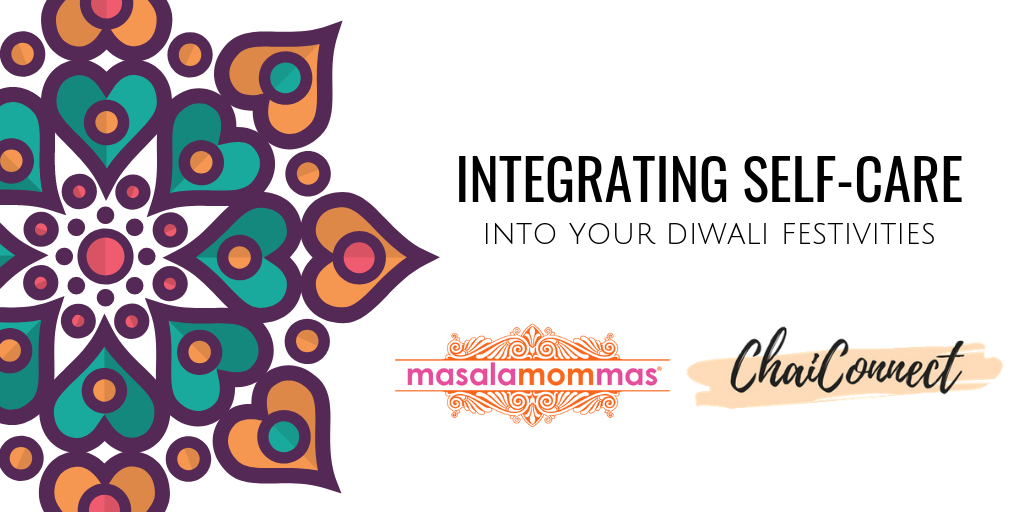
During the holidays, practicing Hindus may find it helpful to turn towards scripture as a foundation for mental health management. Hindu scripture sets a solid foundation for everyday life, and mental health is no exception. For example, in scripture, we celebrate concepts such as finding the strength to stand up for ourselves. And remember, the underlying theme of Diwali is good over evil, light over darkness and knowledge over ignorance.
Self-care is so important for mental health but is often portrayed as an unattainable luxury that is frivolous and selfish. It’s actually quite the opposite and very necessary for self-preservation. The concept of self-care is fluid and can be packaged in various ways, so self-care means different things to different people at different times. It’s also not always glamorous, regardless of how mainstream media chooses to define it.
We’ll outline some ways you can practice self-care to manage your mental health. Our ideas might challenge some of your existing beliefs about self-care and what self-care involves.

Simply stated, self-care is an ongoing commitment that we make to care for ourselves. This might feel like a foreign concept, because we’re conditioned to place others’ desires before our own, especially within the South Asian culture. But neglecting to take care of ourselves can adversely impact our mental health. It’s so important to look out for ourselves. For example, one way to practice self-care is to stand up and speak up for ourselves if someone has hurt us. We’re strong advocates of this; you could say it’s in our Punjabi blood.
Those who misunderstand or do not understand will question this form of self-care. Let them. After all, “kuch toh log kahenge. Logon ka kaam hai kehna. Chodo bekar ki baaton mein kahin beet na jaye raina…” The notorious, “log” may never understand, but it’s more important that we understand and educate those that we can. You’ll find these song lyrics to be applicable in many situations.
Practicing Self-Care
Find Joy – Take a minute and think about what brings you joy. Maybe it’s reading or running. Whatever it is, dedicate some time everyday towards it during the holiday season. Share your joy with your loved ones. 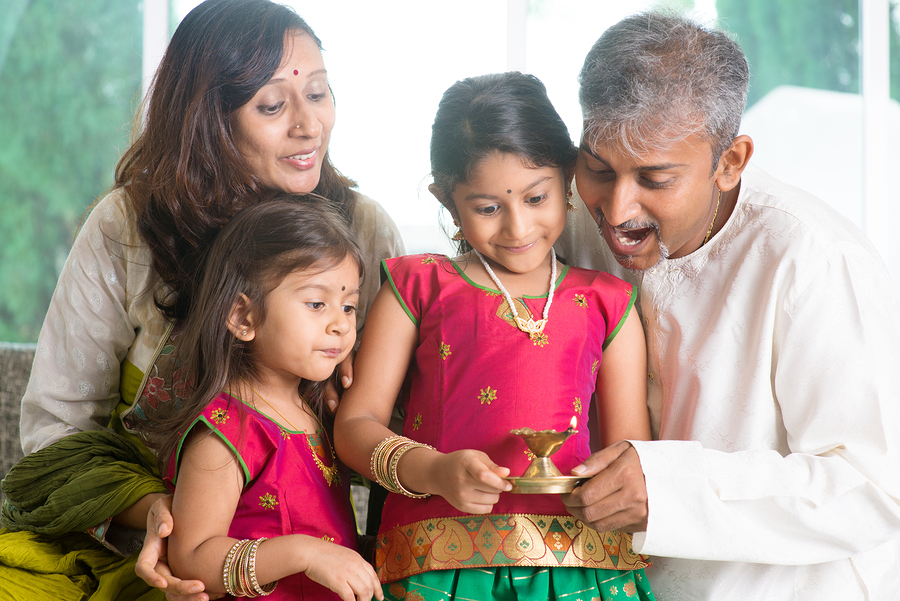
Practice Mindfulness – We can practice mindfulness by focusing on the present moment. This involves focusing on the now and not worrying about the past or the future. Puja and yoga are excellent times to practice mindfulness. But mindfulness doesn’t have to be practiced through an orchestrated event. Take mindful breaks throughout the day to focus on your breath – slowly and mindfully take deep breaths in and out. Shifting awareness to the breath is an excellent way to practice mindfulness.
Take Care of Your Physical Health – Taking care of your physical health is self-care. Stay hydrated, eat a balanced diet, incorporate regular physical activity/movement during Diwali and be sure you’re getting enough sleep. Eat mindfully and according to your dietary needs and meal schedule.
Let Go of Perfection – We’re constantly bombarded with messages portraying a subjective representation of perfection. Guess what? We’ll help lighten this load for you. There’s no rulebook that dictates how the table should be set, what clothes should be worn, how your hair should be styled, etc. Allow yourself to celebrate Diwali in a way that makes sense to you. There’s no one “right” way to do anything, despite what your Pammi Auntie tries to tell you. The weight of expectations (that we set for ourselves and that we interpret from others) can weigh us down.
Avoid Social Media Comparison – Avoid comparing yourself to what you see on social media. Everything looks “perfect” on social media, whatever “perfect” means to you. But remember, social media only highlights what people choose to post. For each selfie that someone posts on social media, countless more are taken and deleted. We only see the selfie that has been selected, edited and filtered.
Surround Yourself with Good People – You may encounter difficult people this Diwali. They might be closely related to you; they might be door ke rishtedaar. In any case, they are basically an example of “kuch toh log kahenge. Logon ka kaam hai kehna. Chodo bekar ki baaton mein kahin beet na jaye raina.” They will always have something to say. So what if your Chachi claims she doesn’t like the fit of your lehenga, or your Pammi Auntie is spreading rumours about you. You do you. They are simply adhering to their role as described in the classic “Amar Prem” song. They will always have something to say.
It’s ok (and necessary) to set boundaries to protect your heart. Use your energy and time with people and situations where you are valued and respected. Take periodic breaks to rest and recharge after interactions with difficult people and situations.
It’s so important to connect and surround yourself with good people. We can’t stress this one enough. This is key. In the presence of difficult people, it’s important to have a strong support system in place to help you process the hurt you feel from the above-mentioned chachi and ‘Pammi Auntie’s’ words and actions. It’s also important to lend support to others who may need it.
Activity:
Light a Candle 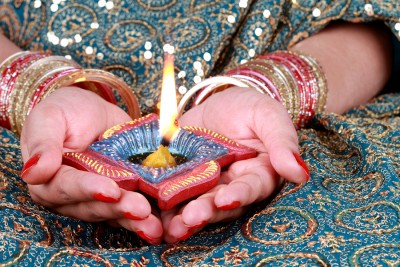
Reflect on this quote as you light your row of diyas this year:
“A candle loses nothing by lighting another candle”
It’s important to have a strong support system and also lend support to others who may need it.
Be the light in someone’s life.
We also love gifting candles during Diwali. Use candles to symbolize love and light (for both yourself and others) and gift candles to your loved ones to celebrate friendship and community.
Thoughts – During this Harvest time, take stock of which seeds you symbolically collected or planted in the Spring. For example, did you find yourself planting seeds of criticism or doubt? Have those seeds resulted in a field of unwanted thoughts? How are those thoughts making you feel? The days and weeks leading up to Diwali are spent cleaning and clearing every nook & cranny in the house, in hopes that Goddess Lakshmi will enter our homes and bless us. What about also clearing our mind of unwanted thoughts? With Diwali also coinciding with Autumn, this is a beautiful time to embrace changing seasons, let go and assess our thoughts. Identify your thoughts and accept any feelings that arise as a result of these thoughts. Work to clear out limiting thoughts and thoughts that are no longer serving you. This is a process that takes time. It’s a much different (and lengthier) process than simply cleaning and clearing out bookshelves, but so very important for our mental health.
Activity: Tree of Thoughts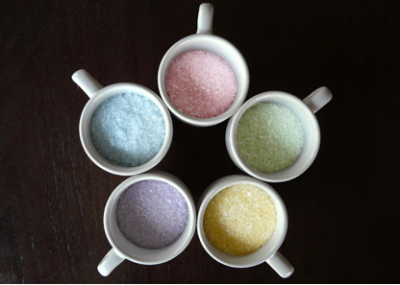
Draw a tree and write various thoughts you commonly have on leaves. Alternatively, cut leaf shapes and paste onto a tree drawing and write thoughts on leaf shapes. Which thoughts need to fall from the tree?
The nice thing about this tree is that you don’t have to wait until Autumn for the leaves to fall. Let this tree serve as a visual reminder of your mind, with the leaves representing various thoughts you commonly have. Periodically assess the tree of thoughts to see which ones are no longer serving you.
Children’s Activities
It’s important to have space for kids to play during Diwali. Don’t worry about planning structured, Pinterest-esque activities. Set up a room designated for free play. Free play is so important — and so underrated in today’s day and age!
With that said, our favourite structured Diwali activity is a simple art station. Art is both relaxing and therapeutic and a fun way to rest and recharge. Join the kids and these activities can also serve as mindful breaks for you!
Colouring
Kids love colouring! All you’ll need are Diwali-themed colouring pages (tons on Google Images) and crayons.
Paper Rangoli Plates 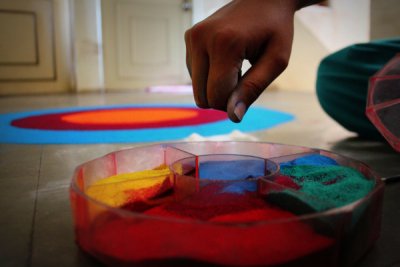
Paper rangoli plates can be as simple or elaborate as you like! We like sticking with just paper plates and crayons for the younger kids. Older kids might like using coloured pencils, markers, gem stickers/embellishments, origami paper and tissue paper.
You might print out rangoli colouring pages for the kids to use as inspiration, but it’s nice to see where kids’ imaginations lead them.
This is just a starting point for this conversation. We’d love to continue this discussion with you. Let us know how you intend to practice self-care during Diwali. Whether it’s prioritizing tasks on your to-do list, learning how to say “no” or finding time to do what brings you joy – we’d love to hear from you!
***

Preeti is a Limited Licensed Professional Counselor experienced in career & leadership development, academic advising and multicultural counselling. She has a B.S. in Human Resource Management and M.A. in Counseling. She is also certified in Teaching English as a Second Language. Preeti is the founder of ChaiConnect, a community for South Asian women best known for its signature monthly gatherings. ChaiConnect provides a space for multigenerational discussion on conversations surrounding wellness, mental health, family, career and societal issues. Preeti is passionate about community, education, mentorship and making a social impact. She lives in Metro Detroit and enjoys spending time with family and friends, baking, travelling, watching movies, writing and yoga. She can be reached at preeti@chaiconnect.org.
©masalamommas and masalamommas.com, 2016-2017. Unauthorized use and/or duplication of this material without express and written permission from this site’s author and/or owner is strictly prohibited. Links may be used, provided that full and clear credit is given to masalamommas.com and Masalamommas online magazine with appropriate and specific direction to the original content.



There are no comments
Add yours